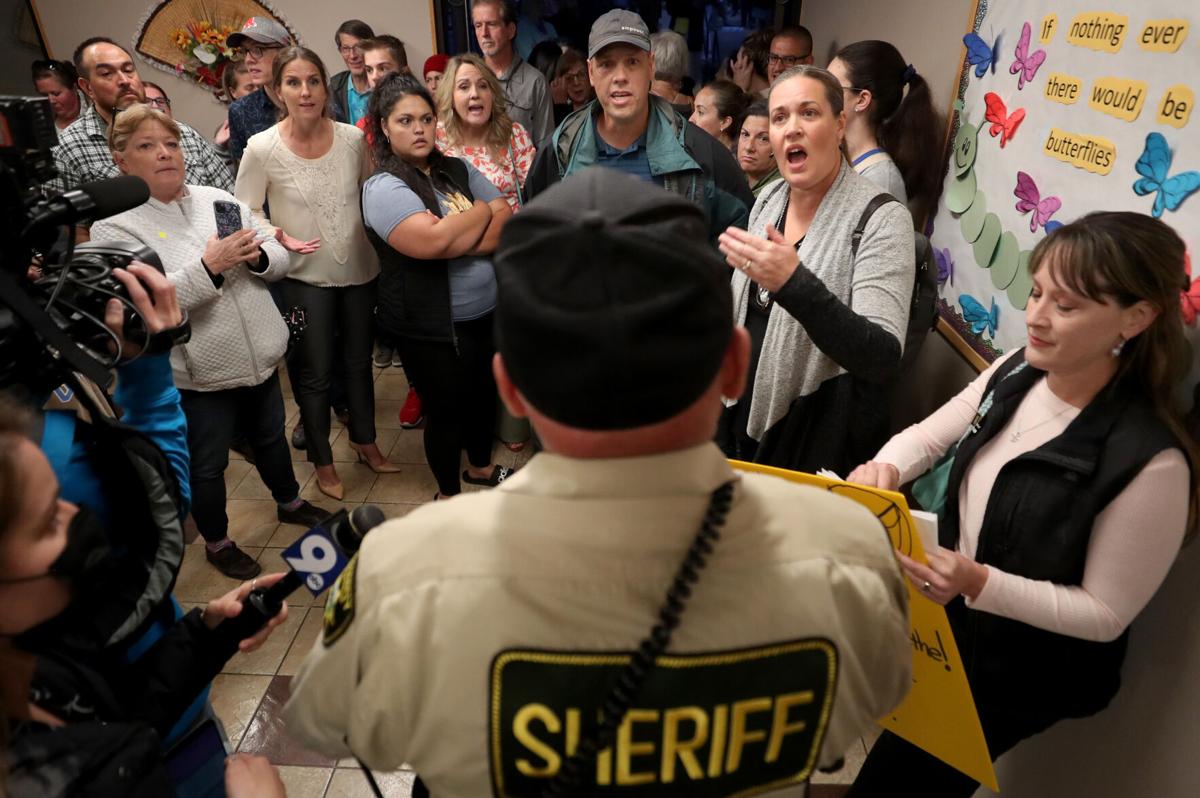PHOENIX — State senators quashed legislation designed to ensure that parents and others can protest outside school board meetings without fear of arrest.
SB 1010 was killed Tuesday on a 4-4 vote as Sen. Tyler Pace, R-Mesa, sided with the three Democrats on the Senate Education Committee who were opposed to the measure.
But what apparently doomed the proposal was not so much the questions about protest rights but a bid by its sponsor, Sen. Michelle Ugenti-Rita, R-Scottsdale, to also convert all future school board races to partisan affairs. She said that was designed to address a problem she sees with the current system.
"I'm not sure that parents know exactly what these school board members believe, what they think,'' Ugenti-Rita said. She candidates having an R or a D, or whatever, behind their names would make a difference.
"Having to identify yourself with your party helps communicate to a potential voter where you stand,'' she said. "And that voter can ask questions.''
Pace, who has on occasion balked at toeing the party line, said the proposal was based on a faulty assumption that those who are registered Republican, as he is, will all vote the same.
Tuesday's vote, however, may not be the end of the issue of protecting protest rights.
Sen. Christine Marsh, D-Phoenix, said she thinks parents and others have been abused by school boards who want to keep protesters far away. "I, too, have been relegated to street corners,'' she said.
Marsh indicated she would support a resurrected version of the measure — one that wouldn't change how school board elections are conducted.
What Ugenti-Rita wants is an an exemption, if people are engaged in "peaceful protesting after school hours," from state laws that make it a crime to interfere with operation of an educational institution.
Her bill also spells out that those who want to protest would not have to first obtain a permit or any other permission from the local school board.
The vote by the Senate Education Committee comes amid heightened tensions both in Arizona and nationally as school boards debate controversial issues ranging from masking and remote learning to teaching of what some refer to as "critical race theory.'' That has at times resulted in protests by parents unhappy with the decisions made by board members.
Ugenti-Rita said there have been situations where school boards call police to have protesters removed from the campus. "So we were not allowed to protest on the property,'' she told colleagues.
She said that undermines the reason for turning out in the first place.
"The whole point is that they see you, we make some eye contact, they read the sign that I made with my daughter, which is why my whole kitchen is full of glitter,'' she said. "I want you to know that I'm there, I want you to see me, I want you to see the numbers.''
She said the issue is not academic. "I've experienced it. They call the cops,'' Ugenti-Rita said.
The ability of school boards to kick protesters off of property "gets weaponized and gets used as a tool,'' she said.
Other lawmakers said it's not that simple, due to issues of liability to the district if something happens on school property.
Marsh suggested one option would be to require those who want to protest on campus to get a permit and insurance, just like anyone else who wants to have an event on school property.
But Ugenti-Rita said protests often happen on short notice, such as after parents see a particular item on a board agenda and then reach out to others to express opposition.
"The whole point of spontaneous protest is it's spontaneous,'' said Sen. Paul Boyer, R-Glendale.
Marsh remained unconvinced, at least partly because of questions about what would be considered "peaceful'' and automatically allowed.
SB 1010 says a protest is peaceful if it does "not pose an obvious threat to persons,'' does not damage property, and does not interfere with or disrupt activities on school property where a school board or other meeting is taking place.
"Who defines 'peaceful'?'' Marsh asked.
Ugenti-Rita conceded there is no good hard-and-fast line. "You kind of know it when you see it,'' she responded.
The real heartburn for some lawmakers was over partisan elections for school boards.
Sen. T.J. Shope, R-Phoenix, pointed to the 12 years he served on the Coolidge school board. Had elections been partisan, it is unlikely that the community, with its Democratic edge, would ever have supported him, he said.





